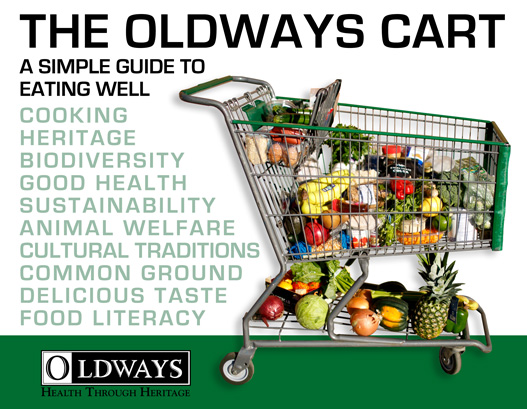Point 3 of Oldways Common Ground Consensus on Healthy Eating states:
The Scientists of Oldways Common Ground lend strong, collective support to the overall process, as well as the overall product, of the 2015 Dietary Guidelines Advisory Committee (DGAC). We express condence in their approach to the weight of evidence. We support a transparent process where the evidence-based report of the scientists is translated directly into policy without political manipulation.
But this isnt what happened.
This statement, written two months prior to the release of the official Dietary Guidelines, gives support to the scientists who worked for a year and a half to review the body of scientific and medical evidence in nutrition. At the end of this review they prepared a report for the Secretaries of Health and Human Services and Agriculture, which, according to health.gov, provides an evidence base for HHS and USDA as the Departments update the 2010 Dietary Guidelines for the 2015 edition.
The governments website also goes on to say the advisory report helps to inform the federal government of the body of scientific evidence on topics related to diet, nutrition, and health.
As part of the review of the body of scientific and medical evidence in nutrition, the 2015 Dietary Guidelines Advisory Committee met for 18 months, and held seven public meetings over the course of its work, beginning in June 2013. The final Committee meeting took place on December 15, 2014.
In their January 28, 2015 letter to HHS Secretary Burwell and USDA Secretary Vilsack, Chair Barbara E. Millen, DrPH, RD, FADA, wrote, The Committee wishes to emphasize that the current evidence base has never been stronger and provides a sound basis to guide the development of public policies and effective nutrition and physical activity interventions to promote health and prevent disease at individual and population levels. We look forward to the translation of this report into future recommendations in the 2015 Dietary Guidelines for Americans.
Despite this belief that the current evidence base has never been stronger, and that this strength provides a sound basis to guide the development of public policies, some of the recommendations were ignored for reasons that can only be surmised as political.
There has been much written in the press and on blogs and websites by respected nutrition scientists, NGOs, and others who work to promote good health and nutrition. Many of the scientists who signed Oldways Common Ground Consensus Statement (including two members of the Dietary Guidelines Advisory Committee) are among those who most passionately protest the resulting Dietary Guidelines, but none more vocal and forthright than David Katz, MD, of Yales Prevention Research Center and founder of the Truth Health Initiative.
These three points (below) are the most revealing about how politics influenced these Guidelines, and how the report of the Dietary Guidelines Advisory Committee, with a strong evidence base, was ignored.
- Backtracking on clear recommendations to eat less meat and more plants.
- Hypocrisy of including physical exercise, but not sustainability because sustainability is not a dietary recommendation and therefore beyond the mandate of the Dietary Advisory Committee.
- A strange disconnect between stating specific foods (fruits, vegetables, whole grains, legumes, etc.) to increase, then switching to nutrient-speak when talking about areas where the Guidelines advise a reduction (saturated fat, sugar, salt), without mentioning specific foods.
It’s the beef!
All three of these points relate to meat. Although the Dietary Guidelines Advisory Committee recommended less meat and more plants, the resulting recommendation is steeped in politics and conflict especially considering that the USDA is largely responsible for the Guidelines and for promoting American meat production. It seems reasonable to assume that the recommendations (1) to eat less meat and more plants, and (2) include sustainability ended up on the cutting poor for the very same reason. Meat production is big business, and the concept of agricultural sustainability is at odds with the way meat is produced in this country. A political football!
In addition, Oldways also believes the Dietary Guidelines could go further by:
- Encouraging Americans to make more than half of their grains whole.
- Emphasizing the quality of dairy products over their quantity.
- Promoting a true Mediterranean Diet. The DGs depiction of the Mediterranean Diet was Med Lite not the real Med Diet, which Oldways has been promoting for 25 years (we created the original Mediterranean Diet Pyramid).
As writing and complaining only do so much, both Oldways and David Katz, with his True Health Initiative, have put forth ways to deal with these weak and highly politicized Dietary Guidelines that ignore the current evidence base that has never been stronger.
Oldways focus is on practicality. We believe the best dietary advice should be practical, emphasizing quality over quantity. To translate dietary guidelines into easy action, Oldways developed the Oldways Cart, which shows a weeks worth of groceries for two adults. An accompanying shopping list and meal plan detail how this sample cartful of foods can be mixed and matched to make up a healthy diet, in line with recommendations in the 2015 Dietary Guidelines Advisory Committee Report. Download the free Oldways Cart Shopping List and Meal Plan here.
Katz goes in a different direction. Believing that the Dietary Guidelines are not what they purport to be, Katz has created a petition to rename the guidelines. The so-called Dietary Guidelines for America are not dietary guidelines as much as they guidelines on how the government tries to balance public health recommendations and corporate interests. Sign this petition to ask the USDA and the Department of Health and Human Services (HHS) to stop false advertising and change the name of the Dietary Guidelines for Americans to Food Policy Guidelines for America.
Our advice: Sign the petition AND download the Oldways Cart!
Sara Baer-Sinnott, Oldways President









